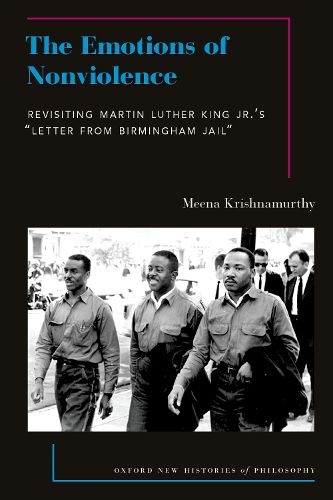Readings Newsletter
Become a Readings Member to make your shopping experience even easier.
Sign in or sign up for free!
You’re not far away from qualifying for FREE standard shipping within Australia
You’ve qualified for FREE standard shipping within Australia
The cart is loading…






"Letter from Birmingham Jail" is perhaps the most beloved and widely read work by Martin Luther King, Jr. Despite the countless publications on its conception and meaning, its broader philosophical significance is often missed. The Emotions of Nonviolence offers a novel interpretation of the Letter, which Meena Krishnamurthy argues is not merely a discussion of civil disobedience, but also an essay on political motivation. In this context, she shows how the Letter seeks to answer a central question in democratic theory: namely, how can and ought we motivate the racially oppressed to engage in civil disobedience, what King called nonviolent direct action? King's answer, she says, is that we should appeal to and encourage the political emotions, both positive and negative. Fear, courage, faith, dignity, indignation, and love can together motivate nonviolent action-and nonviolent action can in turn reciprocally motivate and sustain these same emotions.
Krishnamurthy's novel and important reading of King's Letter illuminates its complexity and its underlying theory of political emotions, including the impediments to action under conditions of injustice, calls some to account for their inaction, engages in propagandizing to motivate a change, and to commend the thousands of ordinary Black people already in motion in pursuit of democracy, freedom, and justice.
$9.00 standard shipping within Australia
FREE standard shipping within Australia for orders over $100.00
Express & International shipping calculated at checkout
"Letter from Birmingham Jail" is perhaps the most beloved and widely read work by Martin Luther King, Jr. Despite the countless publications on its conception and meaning, its broader philosophical significance is often missed. The Emotions of Nonviolence offers a novel interpretation of the Letter, which Meena Krishnamurthy argues is not merely a discussion of civil disobedience, but also an essay on political motivation. In this context, she shows how the Letter seeks to answer a central question in democratic theory: namely, how can and ought we motivate the racially oppressed to engage in civil disobedience, what King called nonviolent direct action? King's answer, she says, is that we should appeal to and encourage the political emotions, both positive and negative. Fear, courage, faith, dignity, indignation, and love can together motivate nonviolent action-and nonviolent action can in turn reciprocally motivate and sustain these same emotions.
Krishnamurthy's novel and important reading of King's Letter illuminates its complexity and its underlying theory of political emotions, including the impediments to action under conditions of injustice, calls some to account for their inaction, engages in propagandizing to motivate a change, and to commend the thousands of ordinary Black people already in motion in pursuit of democracy, freedom, and justice.